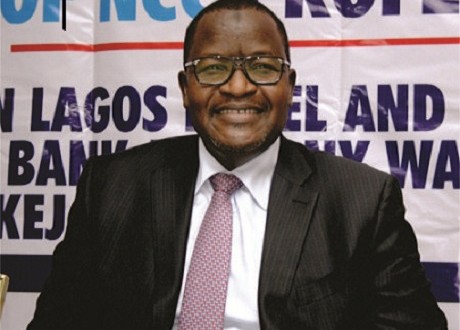
NCC Reiterates Commitment To Increased Broadband Penetration
The Nigerian Communications Commission (NCC) has assured Nigerians of pervasive broadband penetration, irrespective of location.
The Commission said it was conscious of the pivotal role greater broadband penetration would play in actualising deployment of Internet of Things (IoT) devices and Smart Services in any economy, while assuring Nigerians that it has developed a framework to facilitate the deployment of broadband infrastructure in the country.
The Executive Vice Chairman of the NCC, Prof. Umar Garba Danbatta, dropped the hint on Tuesday at the opening session of the First Digital Africa Week organised by the International Telecommunication Union (ITU) and hosted by the NCC in Abuja.
Danbatta told the gathering of global Information and Communications Technology (ICT) experts, that the NCC framework for broadband infrastructure has led to the licensing of six infrastructure companies for North East, North West, South East, South West, South-South and Lagos.
The process for licensing a seventh InfraCo for the North Central including the Federal Capital Territory, Abuja, has been concluded and the licence ready for award very soon, Danbatta said.
The InfraCos are mandated to deploy metro and intercity fibre and broadband point of access with a minimum capacity of 10 gigabyte per second (10 Gbps) across the 774 Local Government Areas of Nigeria.
“With the development of Smart Cities Key Performance Indicators (KPIs) by the ITU, it is imperative to have a pervasive and ubiquitous broadband infrastructure across all our towns and cities to achieve the objectives of making them Smart,” Danbatta said.
He told the experts that “Nigeria has not only achieved but exceeded the 30 per cent penetration target set by the National Broadband Plan (NBP) (2013 – 2018) and at the end of June 2019, our broadband penetration stood at 33.31 per cent.” He further submitted that the NCC would continue to work hard to ensure that all citizens of Nigeria have access to affordable broadband connection irrespective of location.
This assurance, according to Danbatta, was based, “on the digital transformation agenda of the Federal Government anchored on Availability, Accessibility and Affordability of broadband.”
To actualise full expeditious action on the broadband penetration across the states of Nigeria, “we have put in place Broadband Implementation Committee (BIMC) to monitor full implementation of the INFRACO Projects within the four-year implementation plan,” Danbatta declared.
According to him, “We have finalised negotiations on the counterpart funding to InfraCos to support the deployment of the broadband infrastructure on which the Smart Services and other emerging technologies will be hosted.” He added that “this is in tandem with the 8-point agenda of the NCC and declaration of the present administration for the provision of ubiquitous broadband infrastructure across the country in the next level document.”
Meanwhile, the NCC has once more, emphasised the need for telecom consumers and the general public to consciously join hands in protecting telecom infrastructure and regard them as national asset that is collectively owned, crucial and essential for the provision of good service quality.
Director, Zonal Operations, NCC, Amina Shehu, made the call during a sensitisation programme on protection of telecoms infrastructure organised by the Commission in Nasarawa-Eggon Local Government Area, Nasarawa State recently.
Represented by the Principal Manager, Zonal Operations at NCC, Abubakar Usman, the Director, Zonal Operations, also restated the NCC’s commitment towards ensuring improved delivery to telecom consumers by the service providers, which she described as a cardinal goal of the Commission.
Shehu, however stated that, “in recent times, there has been rising public concerns regarding alleged likely negative health effects of Electromagnetic Frequency (EMF) radiation emanating from telecommunication infrastructure, saying such negative concerns have, in some cases, led to interference and or agitation against the deployment of required infrastructure to the detriment of delivering quality telecom services in the country.
She said such interference manifested in vandalism of telecom infrastructure, fibre cuts, theft of sites equipment, incriminate dealing of base transceiver stations (BTS) by government agencies over multiple taxation issue, denial or exorbitant cost of Right of Way (RoW), among others.
“In response to these challenges, the growing concerns over the EMF issues and commitment to public safety, the NCC, through the Zonal Operations Department, deems it necessary as one of its core functions to organise this sensitisation workshop to educate and inform the consumers as well as the general public to protect telecom facilities.
“As we are aware, telecommunication has been an integral part of our daily lives with provision of services ranging from telephony, entertainment, information and learning over a broad range of media platforms,” she said.
The director further noted that over the past fifteen years, the country has experienced tremendous growth in this sector with over 10 per cent contribution to Nigeria’s Gross Domestic Product (GDP), among others.
She explained that the achievements would not have been possible without the active collaboration of all relevant stakeholders and the enabling environment provided by government in the sector, stressing that much as the Commission aims to sustain the growth and as the industry continues to evolve, the industry is faced with various challenges that have hampered development in the sector as it relates to infrastructure deployment.
While emphasising the Commission’s drive for pervasive broadband penetration, Shehu said the NCC would continue to strengthen collaboration with necessary stakeholders in line with its 8-Point Agenda while also pursuing efforts at making telecom infrastructure a critical national asset.
Principal Manager, Technical Standards and Network Integrity, NCC, Kunle Olorundare, spoke extensively on the need to adequately protect telecom infrastructure.
He urged telecom consumers living within the communities where telecom facilities are sited to desist from creating illegal restrictions to telecom facilities and report any act of vandalism to the authorities in their areas.
